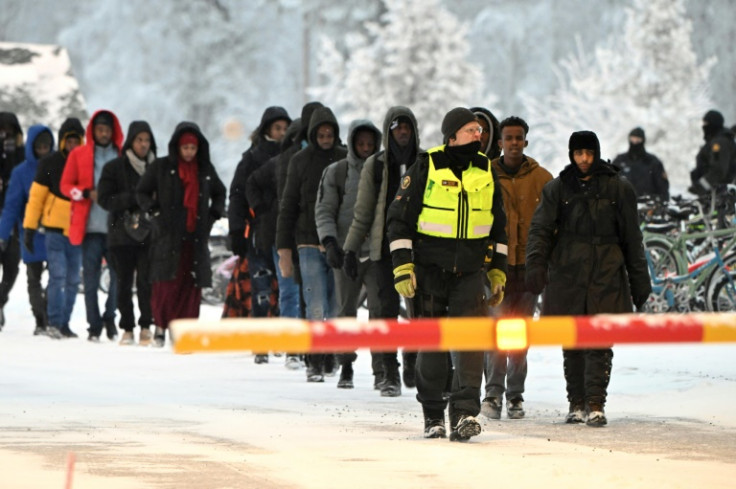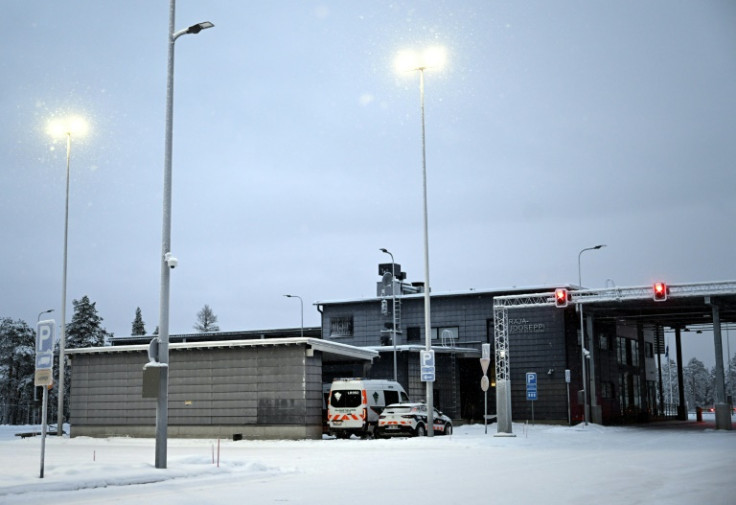Finland Pushing Back 'Weaponised Migration' On Russia Border

Growing numbers of asylum-seeking migrants have in recent weeks been crossing the once quiet border from Russia into Finland in freezing temperatures, a move Helsinki has labelled a hybrid attack.
Cloaked in heavy winter coats, many have been arriving on bicycles, attempting to bypass a ban on crossing the border on foot. Finland barred entry by bicycle last week.
In early October, the Finnish border guard raised the alarm about a shift in Moscow's policy, saying Russia was allowing an increasing number of migrants without proper papers to reach the border.
Since August, around 700 asylum seekers have entered Finland without a visa over its 1,300-kilometre (800-mile) border with Russia.
This prompted Finland, over the past week, to close all but its northernmost border crossing with Russia, in the Murmansk region.
Finnish officials claim Russia is attempting to destabilise its Nordic neighbour.
"This is a systematic and organised action by the Russian authorities," Prime Minister Petteri Orpo said Monday.
Russian Foreign Ministry spokeswoman Maria Zakharova denied Russia was acting deliberately.
"Finnish authorities are beginning to make clumsy excuses, warming up Russophobic sentiments," she said.
Finland's traditionally cordial relationship with its eastern neighbour has soured since Russia's 2022 invasion of Ukraine.
After Finland reversed its decades-long policy of military non-alignment and joined NATO in April, Moscow warned of "countermeasures."
"Russia and the West, including Finland, are in a very deep conflict," said Arkady Moshes, Russia Programme Director at the Finnish Institute of International Affairs (FIIA).
"Weaponising migration is one of the instruments" Russia possesses.
Moshes said there were "parallels" to the Belarus-EU border crisis in 2021.
The EU has claimed President Alexander Lukashenko pushed tens of thousands of migrants across the Belarus border to Poland in retaliation for sanctions.
"The actions of the Finnish government show that the experience of Poland has been taken into account," Moshes said.
The European Union's border protection agency Frontex said Thursday it will deploy 50 officers to Finland, to help boost the country's border controls.
Poland toughened its border to resolve the crisis and Finnish authorities are aiming to do the same.
Anticipating that Moscow could use migrants as political pressure, Finland in February began building a 200-kilometre (124-mile) fence along its Russian border.
But only three kilometres of the fence is finished.
In terms of information warfare, pushing people to the Finnish border is potentially "a double-win situation for Russia," Moshes said.
Finland is left with two bad options: It can either keep the border open and accept the migrants, or close the border completely.
"If Finland does not close its border... that will show that the West is weak" in Russia's eyes, Moshes said.
If Finland closes the border, Russia can play the victim and call the response "a Russophobic action," he added.
But the manoeuvre also poses risks for Russia.
The migrants are predominantly from the Middle East and Africa and have no visas.
Pushing migrants to the Finnish side could attract criticism from Russia's allies in the Middle East and the Muslim world.
Moreover, as long as the migrants are on Russian territory, Russia bears responsibility for feeding and housing them.
"Even Lukashenko at the end of the day had to build shelters for those people," Moshes explained.
Confronted with growing numbers of migrants freezing at its border, Finland is now grappling with balancing its security concerns and human rights obligations.
"That is certainly one of the objectives of hybrid warfare, to try to undermine the key fundamental institutions of the state," University of Eastern Finland law professor Eeva Nykanen said.
Finland's government has considered closing the border, but is conscious of its international obligations.
The availability of locations to seek asylum "may be limited in exceptional circumstances" but Finland is obligated to ensure some access points, Nykanen explained.
Even if the border was fully closed, it is uncertain how Finland would deal with those crossing illegally through the wilderness.
From a legal point of view, a migrant is entitled to submit an asylum application even if they enter illegally, Nykanen said.
As temperatures plummet, it could also become ethically intolerable for Finland to witness migrants freezing behind barbed wire fences.
"That would be a humanitarian crisis that would need to be solved," Nykanen said.

© Copyright AFP {{Year}}. All rights reserved.




















